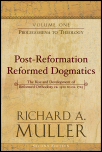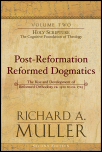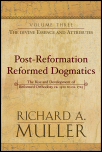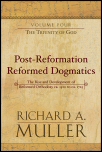Post-Reformation Reformed Dogmatics (4 vols.)
Digital Logos Edition
Overview
A major study reevaluating the primary sources of the post-Reformation era, Richard Muller’s four-volume Post-Reformation Reformed Dogmatics chronicles the development of Reformed theology and documents the rise of Protestant orthodoxy. These volumes contain some of the most important treatments on the theological history of the Reformation, including:
- The formation of Reformed prolegomena
- The relationship between Scripture and theology
- The development of the Reformed doctrine of God
- The Reformed understanding of the doctrine of the Trinity
Contending that the theology of the sixteenth and seventeenth centuries is often misrepresented in church histories and scholarly treatments, Richard Muller has undertaken an exhaustive study of specific doctrines to demonstrate how doctrine developed in the early Protestant period. Muller writes out of the firm conviction that “a detailed study of Protestant thought in the sixteenth and seventeenth centuries is . . . a subject of direct relevance to the life and work of the church today as it attempts to understand itself in the light of its past and formulate its theology in the present.”
Few periods in the history of Christianity have been as badly neglected or as frequently misrepresented in contemporary theological discussions as the period of Protestant Orthodoxy. Richard Muller has overturned conventional wisdom on the significance of this period and redefined the field through his careful and comprehensive analysis of the primary sources. All future work on the history of Protestant theology from 1550 to 1800 will have to take Muller's studies into account.
—David C. Steinmetz, Duke University
The revised versions of volumes 1 and 2 include updated bibliographic references, rearranged chapters and sections, and attractive formatting to match Volumes Three and Four. Scholars, students of the Reformation, theological libraries, and devoted Reformed readers will find these volumes indispensable. Post-Reformation Reformed Dogmatics (4 Vols.) serves as an important addition to the libraries of theologians and pastors, and is intended for scholars interested in the history of thought and the history of Reformed theology from the Reformation to the rise of Protestant orthodoxy. This extensive work demands the attention of anyone interested in the history, the development, and the contemporary expressions of Reformed theology.

- Extensive bibliography of secondary figures and literature
- Extensive footnotes and discussions of secondary literature
- Second and third level subheadings, which clarify the structure and argument
- Detailed table of contents, with links to each section
- Meticulous examination of the development of Reformed theology and its contemporary significance
A work of monumental significance. . . Muller has done for post-Reformation Reformed dogmatics what no one else has done with such detail since the beginning of the eighteenth century (and in its own way, what no one else has ever done). . . Of course anyone working in the area of historical theology, intellectual history, or philosophy cannot afford to miss these volumes.
—Scott F. Sanborn, Kerux
The past continues to speak with powerful relevance to the modern age in the remarkable project of Richard A. Muller in Post-Reformation Reformed Dogmatics. This four-volume work is a tour de force of historical theology and will be of interest to all evangelicals regardless of denominational heritage.
—R. Albert Mohler, Jr., Preaching
Richard Muller has gained an international reputation as a brilliant and incisive commentator on John Calvin and the Reformed tradition. But these volumes are something else. With immense erudition and energy, Muller here displays the theology of the Reformed scholastics in relation to the full sweep of the history of Christian doctrine, expounding it on a truly monumental scale. The scholarly community is permanently in his debt. Muller demonstrates that when used with discernment, the long-neglected wealth of Reformed dogmatics can result in the deepening of theological reflection and preaching in the Christian church.
—Paul Helm, Regent College, Vancouver
Richard Muller's long-awaited volumes represent a work of vast historical scope, profound engagement with the primary and secondary sources, and careful application of sound historical method. By setting seventeenth-century Reformed theology against the background of classical, patristic, medieval, Renaissance, and Reformation intellectual culture, Muller paints a picture of seventeenth-century Reformed theology that belies the old clichés through its nuance, learning, and sophistication. Nobody engaged in this area can afford to ignore his arguments or his conclusions; those who wish to dissent from his central theses have been set a daunting task, and those who find themselves in agreement have been set a standard for their own research.
—Carl R. Trueman, Westminster Theological Seminary
Muller's work, here as always, is marked by an unrivaled mastery of the sources displayed with attentiveness to detail and precise expression. As a historian, he is adept at discerning the continuities and contexts of theological traditions as they grow and develop. His approach to the often-maligned Protestant Scholastics is sympathetic and free of the usual caricatures, and if his work is at all iconoclastic, it is only for the sake of defending writers and communities of the past against their later misrepresentations.
—John Thompson, Fuller Theological Seminary
With the publication of these volumes, the academic community has been given a work of great consequence. . . The comprehensiveness of its analysis and the force of its argument makes this study one of the truly essential works on post-Reformation history and theology. No future research in post-Reformation polemic and theology, whether orthodox or heterodox, can afford to ignore these volumes.
—Chad B. Van Dixhoom, Historical Journal
A multi-decade project that promises to send out ripples for decades to come. . . An accessible reference for the thoughtful elder, pastor, or seminary student. I have already used the work as a reference in preparing adult Sunday school classes, and have found that twenty or thirty minutes of browsing can solidly ground a popularly oriented lesson on key aspects of Reformed thought by establishing the outlines of its historical development. Of course, the more serious use of this resource by professional students in theology also promises to bear untold fruit, as the clear waters from the source of the Reformed tradition reach ever more readers.
—Brian J. Lee, Modern Reformation
- Title: Post-Reformation Reformed Dogmatics
- Author: Richard A. Muller
- Publisher: Baker
- Volumes: 4
- Pages: 2,176

Volume One, Prolegomena to Theology, introduces the study of Protestant scholasticism. Muller defines theology and religion and discusses several aspects of theology as they were understood in the post-Reformation era, including its divisions, object and genus, and fundamental principles. This second edition includes second and third level subheadings, a more exhaustive list of secondary literature, and a more finely focused thesis which complements the other three volumes in this collection.

Volume Two, Holy Scripture, examines post-Reformation understandings of Scripture as the word of God—its divinity, its properties, the integrity of the canon, and its interpretation.

Volume Three, The Divine Essence and Attributes, examines post-Reformation theology on the unity of God's existence, God's divine essence and attributes, and divine will. Included is an analysis of the doctrine of God from the twelfth to the early eighteenth century.
The first two volumes of Richard Muller's Post-Reformation Reformed Dogmatics have already established themselves as the starting point for serious study of the development of the theology of Reformed orthodoxy. It is therefore a great pleasure to have at last the final volumes on the doctrine of God along with the second editions of the first two volumes, which have been revised to take account of more recent scholarship and restructured to give greater clarity to the central theses. Post-Reformation Reformed Dogmatics is set to transform scholarship in both Europe and North America.
—Willem J. van Asselt, University of Utrecht
This volume, along with the others that fill out this project. . . is a noteworthy historical-theological achievement, which will define the field for years to come, and blazes a trail along which both theologians and historians of doctrine will travel in the pursuit of responsible scholarship. Pastors, too, will find a lofty theological education awaiting them in Muller's four volumes—especially if they wish to move beyond a basic textbook of Reformed theology on these topics. They will find that this book is a most informative specimen of historical scholarship. . . Muller's project sets forth an expansive agenda for historians of Reformed doctrine, and serves as a model of the kind of work that can serve the church in its ongoing labor to expound the Scriptures and formulate doctrine. This volume, with those that accompany it, is a landmark achievement and is enthusiastically recommended.
—J. Mark Beach, Mid-America Journal of Theology

Volume Four, The Triunity of God, examines the doctrine of the Trinity, including unity and distinction in the Trinity as they were understood in the sixteenth and seventeenth centuries, and addresses the deity and person of God the Father, God the Son, and God the Holy Spirit.
Richard A. Muller received his Ph.D. from Duke University. He is P. J. Zondervan Professor of Historical Theology at Calvin Theological Seminary and the author of several books, including Church History: An Introduction to Research, Reference Works, and Methods and Dictionary of Latin and Greek Theological Terms.
Reviews
16 ratings

Josh Hayes
9/5/2017
Allan Story
5/5/2017
Randall J. Pederson
11/21/2016
Ray Timmermans
5/5/2015
This excellent set bridges many gaps and answers many questions between the immediate reformers and subsequent periods in the Reformed tradition.Bill Hardecker
9/20/2014

Daniel Caballero
9/5/2014
Since Pelikan, the most useful tool on Post-Reformation- Pre-Critical Studies in Historical Theology! Brilliant achievement!Geoff Smith
7/6/2014
David Betz
3/30/2014